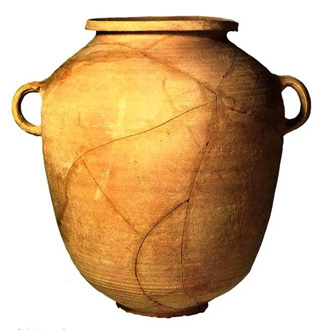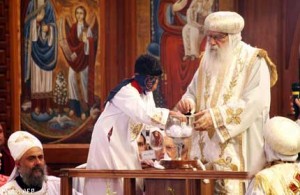====================
This sermon was preached on the First Sunday of Christmas, December 29, 2013, at St. Paul’s Episcopal Church, Medina, Ohio, where Fr. Funston is rector.
(The Revised Common Lectionary, Christmas 1A: Isaiah 61:10-62:3; Psalm 147:13-21; Galatians 3:23-25;4:4-7; and John 1:1-18. These lessons can be read at The Lectionary Page.)
====================
 One of my favorite Christmas hymns is O Come, All Ye Faithful. The last verse of the hymn is:
One of my favorite Christmas hymns is O Come, All Ye Faithful. The last verse of the hymn is:
Yea, Lord, we greet thee, born this happy morning;
Jesus, to thee be glory given;
Word of the Father, now in flesh appearing.
The last line is derived from our Gospel lesson this morning, from prologue to the Fourth Gospel:
“In the beginning was the Word, and the Word was with God, and the Word was God. * * * And the Word became flesh and lived among us.” These verses from the prologue to the Fourth Gospel are among the most beautiful, the most familiar, and the most abstract sentences in Scripture.
Although tradition tells us that the Fourth Gospel was written by the Apostle John, it’s actually highly unlikely that this is true. There are two basic reasons for this.
First of all, the development of the New Testament. A briefly sketched timeline of it would be something like this:
AD 30-33: Jesus is crucified and buried; he rises form the dead, appears to many over a period of about seven weeks; he ascends. The story of this is spread by word of mouth for several years and the “Jesus movement” grows as a sect within Judaism.
AD 35-40: Saul, a Pharisee, becomes a persecutor of the church, but is later converted and becomes Paul the Apostle to the Gentiles, founding churches in several Gentile communities.
AD 45-60: Paul produces the first written materials of what becomes the New Testament, his epistles (letters) to the various churches. These are written basically to solve problems that have arisen in the new Christian congregations.
AD 60-70: As those who personally knew Jesus begin to die, preservation of the story becomes important and the Synoptic Gospels (Matthew, Mark, and Luke) are produced; Mark is probably the first one written. In addition, more letters (the Catholic epistles of Jude, James, 1-3 John, the “letter” to the Hebrews, and so forth) begin to be produced.
AD 85-100: The Fourth Gospel is written.
Now let’s just think about this. Sometime during the third decade of the Christian era, Jesus called James and John, the sons of Zebedee, to be among his disciples. They were working men, possibly as young as 16, more likely in their early 20s, not too much different in age from Jesus himself. This would mean that by the time the Fourth Gospel was written, John would have been about 80 years old! That would have been more than uncommon in that day and age. It is very unlikely that he lived that long. I know that Christian tradition insists that John was the youngest of the disciples and lived to the ripe, old age of 98, but there is truly no evidence of that.
I believe the tradition may be accurate that the Fourth Gospel is based on the memories of John the Apostle, perhaps told (and possibly re-told) to someone who then built the Fourth Gospel from them, but I’m not convinced that John actually wrote this book.
The second reason for disbelieving the traditional attribution of the Fourth Gospel to the Apostle John is its literary style and erudition. Like all of the New Testament, it was written Greek, the common trade and international language of the First Century Roman Empire. Its Greek and its theology are surprisingly sophisticated; this prologue, which the lectionary makes our Gospel Lesson not only for today but also includes in one of the three sets of readings that can be used on Christmas, sets the tone. Its initial verse is probably the most abstract piece of prose in the whole of the Jewish and Christian Scriptures. It is a philosophical statement worthy of the greats of Greek philosophy. John the Apostle was a simple Galilean fisherman! It’s possible that he became a scholar of Greek philosophy and an abstract theologian in later life, but somehow . . . I just don’t think that likely.
So I don’t believe this Gospel was written by John the Apostle, the hot-tempered son of a Galilean fisherman. Instead, I believe it was written by an educated and erudite man, possibly a Greek-speaking Jew of the diaspora familiar with the traditions and texts of Greek philosophy. And from the pen of this man we have this beautiful but abstract explanation of the incarnation of God:
“In the beginning was the Word, and the Word was with God, and the Word was God. * * * And the Word became flesh and lived among us.”
The first verse could very easily have been written by a Greek philosopher living 500 or 600 years earlier. The concept of “the Word” or “the Logos” (to use the original Greek) was first introduced into Greek philosophy by Heraclitus in the Sixth Century BC. In his writings, the Logos seems to be a sort of independent, universal and ideal wisdom according to which all things come to pass, but to which humans cannot attain despite their best efforts. He wrote, “This Logos holds always but humans always prove unable to understand it, both before hearing it and when they have first heard it. For though all things come to be in accordance with this Logos, humans are like the inexperienced when they experience such words and deeds….”
For Aristotle, the Logos is a universal reason or rationality, movement toward which is the optimum activity of the human soul and should be the aim of all deliberate human action. Not long after Aristotle, the Stoic philosophers, starting with Zino of Citium, conceived of the Logos as an active reason pervading and animating the universe; they spoke of a logos spermatikos, the generative principle of the Universe which creates and takes back all things. They seem to have equated it with a psyche kosmou or “soul of the world,” and believed it to be the only vital force in the universe.
The author of the Fourth Gospel apparently knew of this Greek philosophical tradition and reaches into it to explain how it is that God became incarnate (I’ll come back to that word, incarnation, in a moment). It’s as if he’s consciously building a bridge between the philosophical world of the Greeks and the theological world of the Jews. There was precedent for doing so; the Greek-speaking Jews of the diaspora had used the term Logos in translating the Hebrew Scripture’s description of God’s creative activity, as for example in Psalm 33: “By the word (logos) of the LORD were the heavens made. . . .” (v. 6a) The Septuagint’s translators had used, but not expounded upon, the concept of the Logos, and — truth be told — the Greek and Jewish uses and understandings of the word were different.
For the Greeks there was a sharp distinction between the ideal, spiritual world and the mundane, physical world (Plato and Socrates with the “theory of forms,” which taught that there were unattainable ideal forms for every thing and every idea of which the things and ideas in the material world are only “shadows,” are perhaps the extreme case of this). The idea that the Logos, the creative force in the universe, might dirty itself with the material world, was unthinkable; the Logos might communicate directly with human beings, but entering the material world was out of the question. For the Jews, on the other hand, it was no problem to think that God might involve himself in the physical world, after all the Garden of Eden story portrait God as working with dust and clay, molding it with his own hands and breathing life into it from his own lips. For them, the direct communication was a problem! God spoke to humankind through intermediaries, through angels or through specially chosen people (Moses and the prophets); regular folks didn’t talk to God face to face. If a human heard the Logos of God directly, that human would die!
The Fourth Gospel takes on both and builds a bridge between them in this prologue:
“In the beginning was the Word, and the Word was with God, and the Word was God. * * * And the Word became flesh and lived among us.”
In the second of these verses, the author of John’s Gospel asserts (scandalously for the Greeks) that the ideal, the Logos, “became flesh,” sullied itself by taking on earthly form, and (scandalously for the Jews) “lived among us,” as one of us, someone anyone could talk to face to face, a man named Jesus.
The Greek translated as “became flesh” is rather more graphic than our lovely Jacobean archaic translation preserved through the centuries would suggest. Since the King James Version’s translation of these words as “the Word was made flesh” that (or the even more sterile “became human”) has been the typical English rendering of the Greek Kai ho logos sarx egeneto. The important word here is sarx. It might better be translated as “meat,” which would actually be how a speaker of Jacobean English would have understood the term “flesh,” as Strong’s New Testament Lexicon puts it, “the soft substance of the living body, which covers the bones and is permeated with blood,” the part used as food. Meat!
Today is the fifth day of Christmas . . . what should you have received from your “true love” today? Five gold rings! There is a legend that the song from which that is take, “The Twelve Days of Christmas,” was a catechetical device used by Roman Catholics in England and Ireland at a time when their religion was illegal; each of the days and each of the gifts is said to represent in code a particular lesson. A partridge in a pear tree represents Jesus; two turtle doves, the Old and New Testaments; three french hens, the theological virtues of faith, hope, and charity; four colley birds, the four gospels; five golden rings, the five books of Moses – Genesis, Exodus, Leviticus, Numbers, and Deuteronomy. Nice legend, not true! I recently read a musicological analysis of the song suggesting that, instead, the song is all about feasting and partying, and identifying the gifts as the dishes or entertainments that would be offered at a Christmas banquet. According to that author, the five golden rings are the rings on the neck of an English pheasant! The song is all about the meat served at the feast honoring the birth of the God who becomes meat. . . .
Those who speak a little Spanish will be familiar with the word carne, as in carne asada (which means “grilled meat”). Remember that when you think of the “in – carne – tion.” And remember that this incarnate God would later take a loaf of bread and say, “This is my body” of which we are instructed to eat. John’s Gospel, from these very first words in the prologue, is eucharistic in emphasis, insisting that the irruption of the Logos is for our nourishment. An absolute scandal to both Jews and Greeks! (The author of John seems intent on living up to Paul’s assertion that the Gospel is “a stumbling block to Jews and foolishness to Gentiles.” [1 Cor. 1:23])
And then there is that notion that this God who becomes flesh “lived among us,” a very weak translation of the original Greek which means something on the order of “and pitched his tent among us.” Here, the author is reaching back into Jewish history, in to the story of the Exodus. During those forty years in the desert, God was present with the Hebrews in the form of a pillar of fire and cloud which went before them to show them the way, occasionally behind them to guard them from harm, and when they would stop the pillar would stop and rest over the Ark of the Covenant. They were instructed to build a tent to house the Ark, a very elaborate tent but still, just a tent. When they encamped, they were to set it up and place the Ark inside of it. Once it was so housed, only Moses or his brother Aaron the high priest could approach it. Now, however, this enfleshed God was pitching his own tent and living among his people as one of them, someone to whom anyone had access, a man named Jesus.
“In the beginning was the Word, and the Word was with God, and the Word was God. * * * And the Word became flesh and lived among us.”
The prologue to the Fourth Gospel tells us that the Word was the light of creation shining in the darkness, that the Word became flesh that that light might be kindled in all people. There are bible scholars who assert that John was drawing on the wisdom tradition in the Hebrew Scriptures in which Wisdom is personified and portrayed as working with God in the Creation:
When he established the heavens, I was there,
when he drew a circle on the face of the deep,
when he made firm the skies above,
when he established the fountains of the deep,
when he assigned to the sea its limit,
so that the waters might not transgress his command,
when he marked out the foundations of the earth,
then I was beside him, like a master worker;
and I was daily his delight, rejoicing before him always,
rejoicing in his inhabited world and delighting in the human race.
(Proverbs 8:27-31)
I think the prophet Zephaniah might have been drawing on that wisdom image, as well, when he wrote, “He will rejoice over you with gladness, he will renew you in his love; he will exult over you with loud singing.” (Zeph. 3:17b)
And I wonder if the author of the Fourth Gospel might have alternatively used that image . . . or maybe he just left it for us to do. Could we not paraphrase the prologue:
In the beginning was the Word, and the Word was with God, and the Word was God. He was in the beginning with God. All things came into being through him, and without him not one thing came into being. What has come into being in him was life, and the life was the song of all people. The song sings in the silence, and the silence did not overcome it.
And could we not say, “And the Word was made flesh, and sang his song among us?” Someone with whom anyone might sing along, a man named Jesus.
“In the beginning was the Word, and the Word was with God, and the Word was God. * * * And the Word became flesh and lived among us.”
Two short, simply-stated verses from the prologue to the Fourth Gospel, perhaps the most abstract, meaning-laden of verses. I don’t think a simple fisherman from Galilee wrote them, though perhaps he did. When it comes down to it, it doesn’t really matter who wrote them. If we believe they were inspired by God and preserved by the church in the canon of Scripture under the guidance of the Holy Spirit, then we must take them seriously and seek to understand them. No amount of exposition in a sermon can unlock them for you, but I offer you these bits and pieces of information about their background with the encouragement to ponder them, to contemplate them, to pray and meditate about them. In them there is the reason for and the promise of the birth we celebrate in this season.
And it is a season! Despite the fact that the stores started their “after Christmas” sales on December 26, despite the fact that the radio stations are no longer playing Christmas carols, despite the fact that there are no more holiday movies playing on television, it is still Christmas. As I said, this is the fifth day of Christmas, the first of two Sundays in the season!
But I will give the stores and the broadcasters their way for a moment and close with a poem about Christmas being over, a poem by Howard Thurman, sometime dean of the chapels at both Boston University and Howard University, and an honorary canon of the Episcopal Cathedral of St. John the Divine in New York City. It is entitled The Work of Christmas:
When the song of the angels is stilled,
When the star in the sky is gone,
When the kings and princes are home,
When the shepherds are back with their flock,
The work of Christmas begins:
To find the lost,
To heal the broken,
To feed the hungry,
To release the prisoner,
To rebuild the nations,
To bring peace among people,
To make music in the heart.
“To make music in the heart.” Do you ever sing to yourself? I do that a lot. I don’t sing out loud much, but when I’m driving or vacuuming, shoveling snow or doing yard work, I often sing to myself, inside my own head, in my own heart. And I don’t just hum tunes, I sing the words. I sing of the Word incarnate: “Word of the Father, now in flesh appearing. O come, let us adore him.”
As you contemplate the Word made flesh, the light shining in the darkness, the song singing in the silence, pitching his tent and singing his song among us, may your heart be filled with song and may that song empower you to do the work of Christmas. Amen.
====================
A request to my readers: I’m trying to build the readership of this blog and I’d very much appreciate your help in doing so. If you find something here that is of value, please share it with others. If you are on Facebook, “like” the posts on your page so others can see them. If you are following me on Twitter, please “retweet” the notices of these meditations. If you have a blog of your own, please include mine in your links (a favor I will gladly reciprocate). Many thanks!
====================
Father Funston is the rector of St. Paul’s Episcopal Church, Medina, Ohio.
 At first blush, this just feels like another unbelievable story of religious ritual and “magic hands.” It fits neatly into the pattern of war stories one finds in the Torah that are attributed to the Deuteronomist. For that writer, the Hebrews’ victory in battle always depends not on military preparation, strength of arms, or fighting skill, but on ritual exactitude — perform a religious ritual properly and you win, flub it and you lose.
At first blush, this just feels like another unbelievable story of religious ritual and “magic hands.” It fits neatly into the pattern of war stories one finds in the Torah that are attributed to the Deuteronomist. For that writer, the Hebrews’ victory in battle always depends not on military preparation, strength of arms, or fighting skill, but on ritual exactitude — perform a religious ritual properly and you win, flub it and you lose.  An ephah is a bushel, about 35 liters. Ten ephahs make a homer; a tenth of an ephah is an omer. (I’ll bet that was sometimes confusing.) So an omer is 3.5 liters, just a little bit shy of a gallon.
An ephah is a bushel, about 35 liters. Ten ephahs make a homer; a tenth of an ephah is an omer. (I’ll bet that was sometimes confusing.) So an omer is 3.5 liters, just a little bit shy of a gallon. Two days ago we celebrated the Feast of St. Mark the Evangelist and the Gospel lesson for use at the Eucharist was the opening of his Gospel which relates the story of Jesus’ baptism following which, Mark says, “the Spirit immediately drove him out into the wilderness,” (Mk 1:12) so the word “wilderness” caught my attention today.
Two days ago we celebrated the Feast of St. Mark the Evangelist and the Gospel lesson for use at the Eucharist was the opening of his Gospel which relates the story of Jesus’ baptism following which, Mark says, “the Spirit immediately drove him out into the wilderness,” (Mk 1:12) so the word “wilderness” caught my attention today. “Better the devil you know than the devil you don’t know,” was something my grandmother often said. Apparently she took after the ancient Israelites . . . but then don’t most people. We would rather stay in (or return to) a bad situation than face a possibly worse predicament. God know these people well — not too much farther down the road they will complain about their hunger and long for the pots of stew they enjoyed as slaves:
“Better the devil you know than the devil you don’t know,” was something my grandmother often said. Apparently she took after the ancient Israelites . . . but then don’t most people. We would rather stay in (or return to) a bad situation than face a possibly worse predicament. God know these people well — not too much farther down the road they will complain about their hunger and long for the pots of stew they enjoyed as slaves: Darmok and Jalad at Tanagra!
Darmok and Jalad at Tanagra! How does one “test the spirits”? How does one divine the promptings of the spirit or determine the will of God? That’s always the question we must face. In the ancient tabernacle, the high priest’s vestments included a breastplate in which he kept a couple of stones called the urim and the thummim (Exodus 28:30). What those were is a subject of much speculation, but one theory is that they were sort of like dice. The belief is that the high priest cast these dice to determine God’s guidance, to “test the spirit” when faced with a difficult decision.
How does one “test the spirits”? How does one divine the promptings of the spirit or determine the will of God? That’s always the question we must face. In the ancient tabernacle, the high priest’s vestments included a breastplate in which he kept a couple of stones called the urim and the thummim (Exodus 28:30). What those were is a subject of much speculation, but one theory is that they were sort of like dice. The belief is that the high priest cast these dice to determine God’s guidance, to “test the spirit” when faced with a difficult decision. One of my favorite Christmas hymns is O Come, All Ye Faithful. The last verse of the hymn is:
One of my favorite Christmas hymns is O Come, All Ye Faithful. The last verse of the hymn is: When I was in college I was part of group that liked to go backpacking on weekends. Because we were in Southern California, this often meant a trek into some desert wilderness where there was no local water. As a result, we each had to carry enough water for the weekend; as a rule of thumb, that would mean one gallon of water for each day of the hike.
When I was in college I was part of group that liked to go backpacking on weekends. Because we were in Southern California, this often meant a trek into some desert wilderness where there was no local water. As a result, we each had to carry enough water for the weekend; as a rule of thumb, that would mean one gallon of water for each day of the hike.  I’m not the least bit sure I like the last thought of Jesus reply . . . Is he suggesting that a loving God caused this innocent man’s blindness so that Jesus could come along and heal him with some mud made of spittle and demonstrate his power? I mean, really, is he? I don’t want to get into that today, but surely there must be another interpretation for Jesus words and perhaps someday I’ll explore that.
I’m not the least bit sure I like the last thought of Jesus reply . . . Is he suggesting that a loving God caused this innocent man’s blindness so that Jesus could come along and heal him with some mud made of spittle and demonstrate his power? I mean, really, is he? I don’t want to get into that today, but surely there must be another interpretation for Jesus words and perhaps someday I’ll explore that. 

